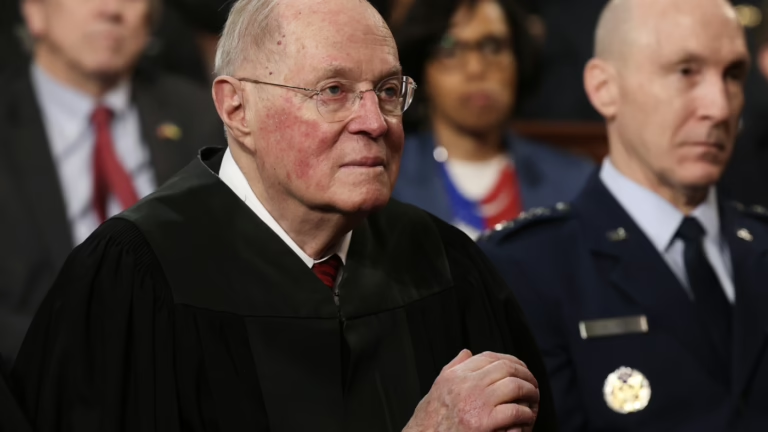Retired Supreme Court Justice Anthony Kennedy at President Trump’s joint session of Congress, March 4, 2025, Washington, D.C.
Win McNamee/Getty Images
hide caption
toggle caption
Win McNamee/Getty Images
Throughout my extensive experience covering the Supreme Court, I have encountered numerous books penned by justices. With a few rare exceptions, most tend to be rather dull and uninspiring.
Retired Justice Anthony Kennedy breaks this mold with his compelling new memoir, Life, Law, & Liberty, set to be published on October 14. In it, Kennedy offers an unusually candid glimpse into his personal journey and his three decades on the nation’s highest bench. During that time, he frequently served as the pivotal “swing vote” in landmark rulings on issues such as same-sex marriage, campaign finance, affirmative action, and abortion.
For much of their overlapping service, Kennedy and Justice Sandra Day O’Connor occupied the ideological middle ground of a court that was steadily shifting rightward. Both hailed from the American West and were appointed by President Ronald Reagan, a connection they credited with shaping their judicial philosophies. Initially staunch conservatives, they witnessed firsthand the court’s transformation into a more conservative institution. As Kennedy reflects in his book, “The cases swung, not me.”
Deep Concerns for America’s Future
In an upcoming NPR interview, Kennedy expressed profound apprehension about the current state of the nation. He lamented the decline of reasoned, respectful dialogue, replaced instead by hostile and divisive exchanges. “Democracy is not guaranteed to survive,” he warned.
Kennedy also voiced unease about the increasingly partisan tone found even within Supreme Court opinions. “Partisanship is growing more bitter and pervasive,” he noted, urging the court to adopt a more measured and respectful approach in its rulings.
Upon his retirement in 2018, Kennedy was optimistic that the court’s landmark decisions would endure. However, when asked recently, he hesitated to reaffirm that confidence.
Although Kennedy often sided with the court’s conservatives in close cases, his memoir reveals the nuanced reasoning behind his crucial votes aligning with liberals, particularly on abortion and same-sex marriage. Interestingly, he found the issue of gay marriage more straightforward to decide, though it strained his relationship with conservative Justice Antonin Scalia.
Championing Marriage Equality
Beginning in 1996, Kennedy authored every significant Supreme Court ruling on gay rights, culminating in the 2015 landmark decision Obergefell v. Hodges, which legalized same-sex marriage nationwide. In his majority opinion, he eloquently stated, “No union is more profound than marriage, for it embodies the highest ideals of love, fidelity, devotion, sacrifice, and family.”
One of the most compelling factors influencing Kennedy was the realization that many states denied legal parental rights to one partner in a same-sex couple, leaving children without the security of having two recognized parents. This legal gap, he observed, was “deeply humiliating for the children of gay parents” and affected hundreds of thousands of families.
The decision, however, caused a nearly year-long rift with Justice Scalia, whose dissent included the infamous line that if he ever joined such an opinion, he “would hide [his] head in a bag.” Other conservative justices found Scalia’s tone offensive and urged him to soften it, but to no avail. This tension led Chief Justice John Roberts to author the principal dissent instead.
While Kennedy could brush off Scalia’s harsh words, his family was deeply hurt by the bitterness. The once close colleagues saw their friendship cool, with Scalia avoiding their usual lunches and visits.
Then, in February 2016, Scalia unexpectedly visited Kennedy’s chambers to discuss their strained relationship. He expressed regret over his dissent’s harshness and apologized. The two shared a rare embrace, a moment Kennedy describes as a meaningful milestone. Scalia promised to reconnect after a hunting trip in Texas, but tragically, he passed away during that trip. Kennedy reflects poignantly, “If friendships are slipping away, we must renew them soon, lest time does not permit us to celebrate them for long.”
Reflections on Abortion and Judicial Responsibility
Abortion is another deeply personal and complex issue Kennedy explores. A devout Catholic who regularly attends Mass, he regards abortion as a moral wrong. At one point, the weight of this conflict led him to contemplate resignation. “Another life is involved, one that cannot speak for itself,” he writes, emphasizing the unborn child’s silent plea for existence.
Nevertheless, Kennedy ultimately concluded that personal beliefs must not dictate judicial decisions. Co-authoring the opinion that upheld abortion rights, he affirmed that the Constitution guarantees a sphere of personal liberty beyond government intrusion, with a woman’s choice to bear a child among the most intimate decisions protected by law.
Challenging Originalism
This stance exemplifies Kennedy’s opposition to the originalist philosophy embraced by the current conservative majority, which interprets the Constitution strictly according to its 18th-century meaning. Kennedy advocates for a more dynamic understanding of liberty, one that evolves over time.
He argues that relying on archaic dictionaries to define constitutional terms is insufficient. Quoting from his same-sex marriage opinion, he writes, “The nature of injustice is that we may not always see it in our own times. The generations that wrote and ratified the Bill of Rights and the Fourteenth Amendment did not presume to know the extent of freedom in all its dimensions, and so they entrusted to future generations a charter protecting the right of all persons to enjoy liberty as we learn its meaning.”
In his view, the framers deliberately chose broad language like “liberty” to inspire and safeguard freedom, acknowledging their own uncertainty about its full scope.
A Western Legacy and Personal Anecdotes
While some conservatives criticize Kennedy’s evolving views, others may find comfort in his honest recounting of how his perspectives shifted. For example, he initially supported the death penalty for juvenile offenders but later reversed his position, influenced by international norms and scientific research showing adolescents’ impulsivity.
Despite the serious tone of much of the book, Kennedy shares lighter moments as well. One amusing story involves a red emergency phone in his chambers that rarely rang-until one day it did. An Ohio prisoner had somehow obtained the number and called to discuss court decisions. Though court security planned to change the number, Kennedy enjoyed these unexpected conversations, hearing firsthand which rulings the inmate supported or opposed.
Kennedy also delves into his family background, his upbringing in Sacramento during the 1930s and ’40s, and his father’s courageous opposition to Japanese internment during World War II. As a frail child, Kennedy was encouraged by his parents to read early, even reciting Shakespeare aloud in the car before he was ten.
After his father’s sudden death in 1963, Kennedy, then a young lawyer in San Francisco, returned to Sacramento to manage the family law practice at just 27. He remained rooted there for 25 years, becoming the nation’s youngest federal appeals court judge at 38, before his 1988 Supreme Court appointment.
He fondly recalls Sacramento as a small town of about 130,000, evoking vivid images of its atmosphere and landscape-poetic reflections that enrich the memoir.
Nina Totenberg has been NPR’s Supreme Court correspondent since 1975.

















